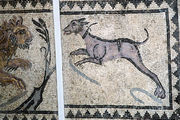The Modern Dog
common training and behavior problems

While different dog breeds show extreme variation in size, color, facial features and other physical attributes, all dogs maintain the same basic patterns of behavior as their ancestor the wolf.
This is great news because as trainers, owners, and dog lovers, we only have to learn one set of behavior patterns to be able to train all dogs. Although dog behavior is the same for all dogs, each dog breed has distinct characteristics and every dog has their own unique personality. By understanding your dog at each of these levels, we create training methods that are based not only on your dog's instinct but are also tailored to you and your unique dog.
In general, dog owners call us with a variety of issues, some of the most common are:
- Excessive Barking
- Pulling and other poor leash manners
- Jumping up on people
- Fearfullness
- Begging
- Nipping, mouthing or biting
- People aggression
- Dog aggression
- Food aggression
- Dominance issues
- Excessive attention seeking
- Chewing
- Nervousness and anxiety
- Puppy Training
- Jumping on counters
- Chasing animals, people or cars
- Knocking over the kids
- Rushing out the door
- Seperation Anxiety
- Whining
- Housebreaking
- Digging
- Car sickness
- Getting in the garbage
- Not coming when called
- General obedience
For recommended reading on dog behavior, view our listmania list at amazon.com.
![]()
dogs
From Wikipedia, the free encyclopedia
Among dog lovers, dogs are generally valued for their intelligence, and both anecdotal evidence and scientific research suggest that dogs have a reasonably high intelligence. This intelligence is expressed differently with different breeds and individuals, however. For example, Border Collies are noted for their ability to learn commands, while other breeds may not be so motivated towards obedience, but instead show their cleverness in devising ways to steal food or escape from a yard. Dogs are descended from wolves, and are also pack animals, making them easier than other animals to train because dogs' instincts are to obey. But most dogs rarely have to deal with complex tasks and are unlikely to learn relatively complicated activities (such as opening doors) unaided. Some dogs (such as guide dogs for the visually impared) are specially trained to recognize and avoid dangerous situations.
There are numerous dog breeds, with over 800 being recognized by various kennel clubs worldwide. As all dog breeds have been derived from mixed-breed dog populations, the term "purebred" has meaning only with respect to a certain number of generations. Many dogs, especially outside the United States and Western Europe, belong to no recognized breed.
A few basic breed types have evolved gradually during the domesticated dog's relationship with man over the last 10,000 or more years, but most modern breeds are of relatively recent derivation. Many of these are the product of a deliberate process of artificial selection. Because of this, some breeds are highly specialized, and there is extraordinary morphological diversity across different breeds. Despite these differences, dogs are able to distinguish dogs from other kinds of animal.
The definition of a dog breed is a matter of some controversy. Depending on the size of the original founding population, closed gene pool breeds can have problems with inbreeding, specifically due to founder effect. Dog breeders are increasingly aware of the importance of population genetics and of maintaining diverse gene pools. Health testing and new DNA tests can help avoid problems, by providing a replacement for natural selection. Without selection, inbreeding and closed gene pools can increase the risk of severe health or behavioural problems. Some organizations define a breed more loosely, such that an individual may be considered of one breed as long as 75% of its parentage is of that breed. These considerations affect both pets and the show dogs entered in dog shows. Even prize-winning purebred dogs sometimes possess crippling genetic defects due to founder effect or inbreeding.[21] These problems are not limited to purebred dogs and can affect mixed-breed populations.[22] The behavior and appearance of a dog of a particular breed can be predicted fairly accurately, while mixed-breed dogs show a broader range of innovative appearance and behavior.
In February 2004, the Canine Studies Institute in Aurora, Ohio, arranged recognized breeds of dogs into ten categories.
Mixed-breed dogs or Mongrels are dogs that do not belong to specific breeds, being mixtures of two or more in variant percentages. Mixed breeds, or dogs with no purebred ancestry, are not inherently "better" or "worse" than purebred dogs as companions, pets, working dogs, or competitors in dog sports. Sometimes mixed-breed dogs are deliberately bred, for example, the Cockapoo, a mixture of Cocker Spaniel and Miniature Poodle. Such deliberate crosses may display hybrid vigor and other desirable traits, but can also lack one or more of the desired traits of their parents, such as temperament or a particular color or coat. However, without genetic testing of the parents, the crosses can sometimes end up inheriting genetic defects that occur in both parental breeds. Deliberately crossing two or more breeds is also a manner of establishing new breeds.
Wikipedia contributors, "Dog," Wikipedia, The Free Encyclopedia, http://en.wikipedia.org/w/index.php?title=Dog&oldid=89574098 (accessed November 23, 2006).
![]()
Breed Specific Behavior
We encourage the potential dog owner to fully investigate individual breed and bloodline characteristics before acquiring a new dog. We will continue to add to and update this section over time.
Call 203.232.8018 or email John to discuss how we can help you and your terrier live happily ever after.
Dog Breed Groups

